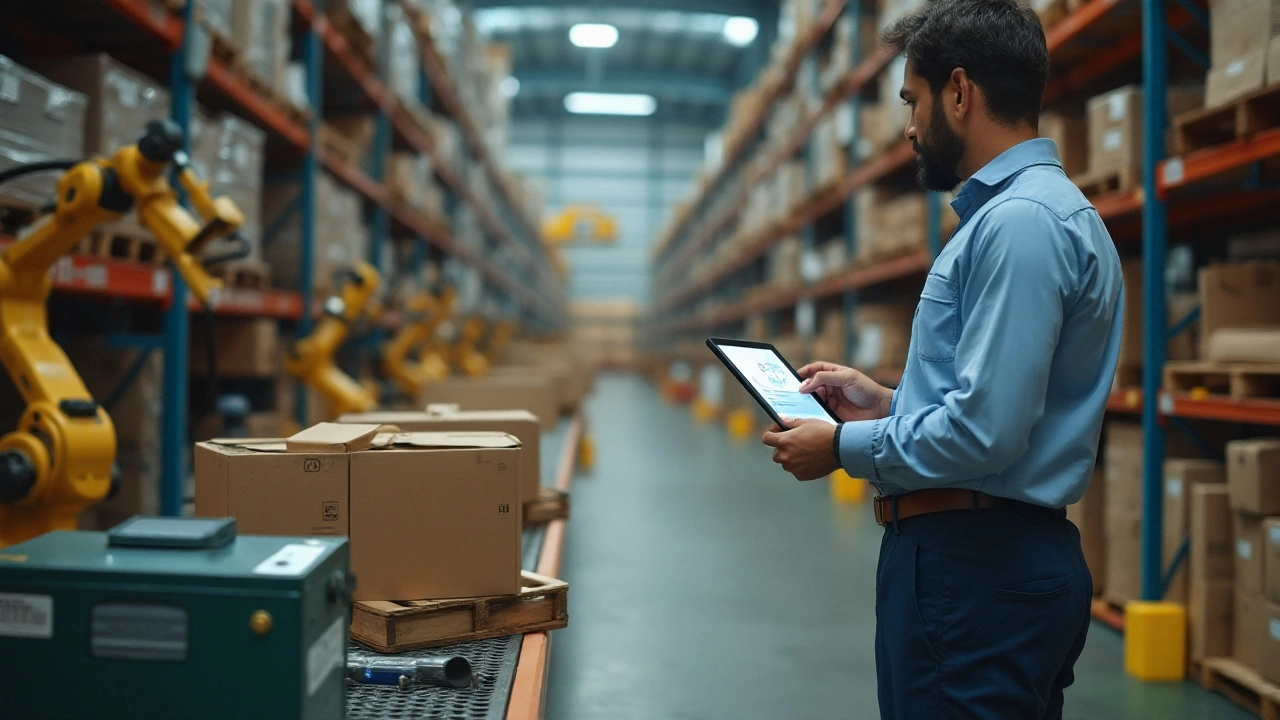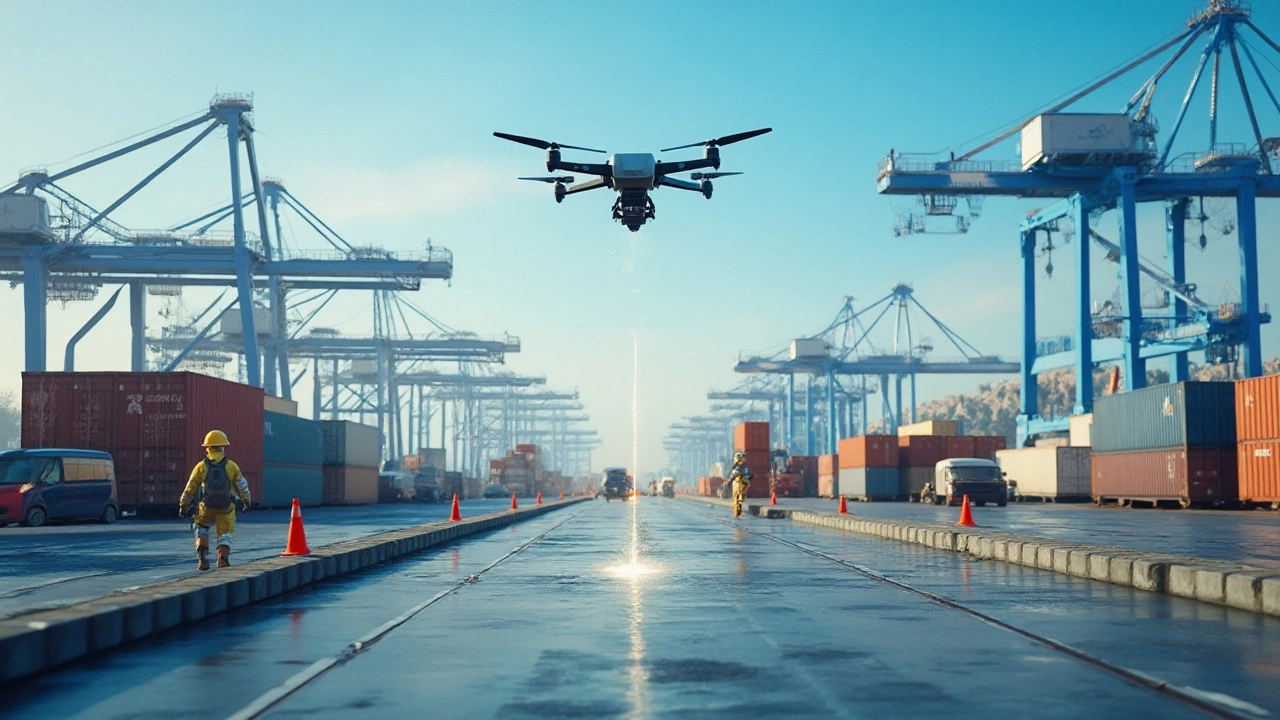Revolutionizing Supply Chain Management with AI Technology

In a world that's buzzing with technology, the application of Artificial Intelligence in supply chain management isn't just a trend—it's a revolution. This critical shift is helping businesses operate more smoothly and efficiently than ever before. Imagine having the power to foresee supply chain disruptions or optimize delivery routes instantly. These are just a few examples of what AI brings to the table.
With AI, companies are not only saving resources but also making informed decisions that amplify their agility in the market. Whether it's predicting customer demand accurately or managing inventories with precision, AI tools are becoming indispensable allies. This article delves deeply into the transformative role of AI, showing you practical ways to implement it in your operations.
- Understanding AI in Supply Chain
- Predictive Analytics for Demand Forecasting
- AI-Driven Inventory Management
- Smart Logistics and Transportation
- Reducing Costs with AI Solutions
- Future Trends and Innovations
Understanding AI in Supply Chain
As we navigate through the intricacies of modern business, understanding how AI is reshaping the supply chain landscape is crucial. AI isn't just a buzzword anymore. It's the backbone of today’s logistics and supply chain operations. With its ability to learn from data and adapt to changing patterns, AI does much more than automate processes. It offers insights and predictions that were once impossible. This means businesses can now anticipate potential disruptions before they become problems. Imagine being able to predict a port shutdown days in advance! AI tools analyze vast amounts of data quickly, providing valuable foresight that traditional methods can’t match.
The implementation of AI in supply chains involves various technologies, including machine learning, natural language processing, and computer vision. Each of these branches contributes uniquely. For instance, machine learning enables predictive analytics which is vital for demand forecasting. Natural language processing helps in improving the interactions between systems and users, enhancing the overall supply chain communication. AI's ability to process and interpret visual data through computer vision is essential for tasks such as quality checks and inventory monitoring. A study by McKinsey suggests that companies that fully utilize AI in their supply chains can lower logistics costs by 15%, warehousing costs by 35%, and improve inventory levels by 75%.
Let's delve into a typical scenario: a global company managing thousands of shipments daily. Traditional methods struggle to keep up with such demands, often leading to delays and inefficiencies. Incorporating AI changes the game, as it brings real-time monitoring and optimization, reducing waste and increasing efficiency. AI systems can provide alerts for rerouting shipments if they detect potential bottlenecks, thereby minimizing delays and saving costs. A quote by Andrew Ng, a prominent AI scientist, resonates here:
"AI is the new electricity. Just as electricity transformed many industries a century ago, AI is now prepared to do so."This couldn't be truer for supply chains.
Analyzing data from multiple sources, such as weather forecasts, geopolitical alerts, and even social media, AI prepares supply chain managers to make informed decisions swiftly. Such intelligence is crucial when planning operations across different regions, where every minute detail can impact the bottom line. By tapping into AI's capacity to process unstructured data, companies gain a competitive edge through improved speed and accuracy in their supply chains. Now, businesses are stepping beyond merely reacting to problems. They actively prevent issues from arising in the first place, establishing stronger customer relationships due to consistent and timely product deliveries.
Predictive Analytics for Demand Forecasting
In business, knowing what your customers want before they even do is like having a magician's trick up your sleeve. This is where predictive analytics becomes a game changer in the supply chain landscape. At the heart of this technology is the ability to crunch vast amounts of data and turn them into foreseeable market patterns. With AI tools, companies can anticipate demand curves, adjust inventory levels, and ultimately make sure the right products are available at the right time. This isn't just theoretical mumbo jumbo; it's a tangible advantage that can boost sales and customer satisfaction.
Think about this: businesses used to depend on historical data and market surveys, which could be slow and sometimes unreliable. Now, with AI, demand forecasting becomes more dynamic. The software learns from each transaction, considering factors like seasonality, economic shifts, and even social media trends. These insights allow for better planning and decision-making. It's like having a crystal ball that, instead of predicting the future in vague terms, provides actionable business intelligence. As a result, businesses aren't just reacting to market shifts; they're anticipating them.
AI-driven demand forecasting doesn't operate on guesswork. Using algorithms that literally evolve over time, it continuously refines its predictions, adapting to new information much like how a tree soaks up water from the ground. This evolving accuracy ensures that businesses can pivot quickly when unexpected changes occur, such as a sudden spike in product demand due to viral internet trends. This isn't just some pie-in-the-sky idea—it’s happening now. According to a study by MIT, machine learning models can improve demand forecasting accuracy by up to 50%, giving proactive companies a substantial edge over competitors.
"Incorporating AI into demand forecasting functions can enhance efficiency by enabling faster responses to customer needs, thus creating more nimble supply chains," notes Andrew McAfee, co-director of the MIT Initiative on the Digital Economy.
Having safeguard measures like AI in place is not just about boosting sales; it also minimizes the risks of overstocking and stockouts, both of which can be costly. Overstocking ties up capital and increases storage costs, while stockouts can harm a brand's reputation and lead to lost sales. With AI, balancing these opposing issues becomes more straightforward. For small businesses especially, these technologies offer a leap over traditional limitations, letting them compete with larger, resource-wealthy companies.
Implementing AI-driven predictive analytics requires a thoughtful approach, however. It’s essential to integrate these systems with existing infrastructure, ensuring that data flows seamlessly from point-of-sale systems, supply chain management software, and even customer relationship management tools. It might sound complex, but the benefits—both immediate and long-term—are notable. As this technology matures, the need for human oversight decreases, allowing supply chain managers to focus on strategic planning rather than fire-fighting daily logistical issues.

AI-Driven Inventory Management
Let's dive into the fascinating world of AI-driven inventory management, where technology meets efficiency, redefining how businesses oversee their stock. Companies are using Artificial Intelligence to take the guesswork out of managing their inventories. By leveraging sophisticated algorithms, AI tools can analyze historical data and current market trends to predict demand. This insight keeps warehouses stocked in the most efficient manner, ensuring that shelves are never bare when customers need something, yet also avoiding excess stock that ties up capital.
One of the standout features of AI in this field is its ability to manage stock at the granular level. Think of it this way: AI can monitor individual units of a product, automatically alerting or even triggering restock orders when levels fall below certain thresholds. This method not only saves time but also reduces human error, which can be a costly mistake in inventory management. Traditional methods often rely on periodic review systems, which might miss trends that develop between reviews. AI provides a real-time glance at everything, making adjustments possible around the clock.
An article by MIT Sloan Management Review noted that, "AI's predictive capabilities allow businesses to navigate uncertainties in supply chain management with unprecedented accuracy."
Let's not forget the role of AI in optimizing storage and order picking processes. For instance, Warehouse Management Systems (WMS) powered by AI can dynamically allocate space based on the turnover rate of different items. Faster-moving goods are placed near dispatch areas, while those less frequently requested are stored further back. This not only speeds up the picking process but also saves a significant amount of energy resources, contributing to both cost savings and environmental protection. It's a win-win scenario—keeping bottom lines healthy while embracing sustainability.
As the needs of businesses evolve, so too do the applications of AI in inventory management. Another sophisticated application is the adjustment of pricing strategies based on inventory levels and demand forecasts. When combined with dynamic pricing models, AI can maximize profits by suggesting the optimal price point for a product. It balances between demand, competition, and inventory availability to suggest prices that will move products at the best possible margin.
Practical Tips for Implementing AI Tools
For those considering the leap into AI for inventory management, start by clearly defining your goals and expectations. Are you looking to cut costs, improve service levels, or perhaps both? This clarity will guide your implementation strategy. Also, ensure that your data is clean and organized. AI systems rely heavily on data input; the more precise and comprehensive your data, the better the predictive outcomes will be. Good data hygiene practices should never be underestimated. Moreover, companies should not shy away from starting small. Pilot projects with specific lines of product provide insights without requiring full-scale implementation. As these pilot programs succeed, the scale and scope of AI tools can be gradually expanded across the organization.
To give you a clearer picture, consider the following table illustrating the benefits realized by several companies after implementing AI in their inventory management processes:
| Company | Inventory Holding Reduction | Order Accuracy Improvement |
|---|---|---|
| XYZ Logistics | 15% | 25% |
| Retail Innovators | 35% | 30% |
| ABC Enterprises | 22% | 28% |
This section only scratches the surface of what’s possible with AI. Looking forward, we can anticipate even more innovative solutions and systems that deepen the integration of AI across all aspects of supply chain management. Embracing AI technology, companies stand to gain not only current operational benefits but also a competitive edge in the rapidly evolving market landscape.
Smart Logistics and Transportation
When we talk about smart logistics and transportation, we're diving into a domain where technology and imagination join forces. Picture an intricate web where every truck, ship, or warehouse communicates seamlessly with each other in real-time. This is not the future; it's the present, made possible by AI. One of the most exciting features of AI in logistics is its ability to optimize delivery routes. Drivers are equipped with navigation systems that adapt routes on-the-fly, taking into account real-time traffic data, weather conditions, and even customer availability. This type of precision wasn't possible before AI made its grand entrance.
AI is also helping logistics companies ensure that vehicles are used efficiently. Fleet management systems powered by AI can predict when a vehicle might need maintenance long before it becomes a problem, maximizing uptime and minimizing costs. This is a game-changer because it reduces unexpected breakdowns which can throw schedules off balance. Inventory that's delayed because of a broken truck can hurt a company's bottom line. But with AI, those risks are minimized, creating a smoother, more reliable supply chain.
Another fascinating application of AI in logistics is its role in warehouse automation. Robotics and AI algorithms are increasingly being used to sort and categorize items with unmatched accuracy and speed. This minimizes errors and maximizes efficiency. For instance, Amazon uses robots to fetch goods in its warehouses, cutting down the need for human labor and speeding up the process significantly. According to a report by McKinsey & Company, "AI has the potential to create $1.3 trillion of value by 2030 in the logistics and transportation sector alone."
Moreover, AI-driven analytics offer companies new insights into their operations. By analyzing vast amounts of data generated across their supply chains, businesses can derive insights that lead to informed decision-making. Imagine having a dashboard that tells you which routes generate the most profits or where delays are most likely. These insights are not just numbers; they are strategic advantages that let companies respond swiftly to changing conditions. Embracing these AI tools is no longer an option but a necessity if firms wish to remain competitive.
To sum up the impact of AI on logistics and transportation, we can look at the tremendous cost savings and enhanced customer satisfaction it delivers. When goods move smoothly from point A to point B, it means happier customers and increased sales. The reach of AI in transforming logistics is significant. It goes beyond just moving stuff from one place to another; it's about creating smarter, more resilient supply chains that can withstand challenges and thrive in the age of information.

Reducing Costs with AI Solutions
Cost efficiency is a universal goal across all industries, and in the realm of supply chain management, the influence of AI can be transformative. Historically, businesses have grappled with the relentless challenge of minimizing costs while maintaining quality and service. This is where AI steps in, offering sustainable solutions that significantly cut down expenses without compromising on efficiency or output. By implementing AI-driven strategies, companies can achieve a balance that was once considered almost impossible.
One of the most compelling advantages of integrating AI into supply chains is its unparalleled ability to enhance predictive maintenance. Machines and equipment are vital assets in any logistics operation, and their unexpected failure can lead to significant downtime and financial losses. AI tools, through their sophisticated algorithms, can analyze historical data and predict potential breakdowns before they occur, allowing for timely interventions. This proactive approach not only reduces repair costs but also extends the lifespan of equipment, translating directly into financial savings.
Inventory management is another critical area where AI proves to be extremely beneficial. Holding excess stock ties up capital and incurs storage costs, while running out of stock can lead to disrupted sales and dissatisfied customers. AI-driven systems are adept at analyzing patterns based on sales history, market trends, and seasonality to forecast inventory needs with remarkable accuracy. This means businesses can maintain optimal inventory levels, thereby reducing the cost burden of overstocking or understocking.
In logistics and transportation, which traditionally consumes a large chunk of expenses, AI can optimize routes and reduce fuel consumption significantly. By analyzing real-time data such as traffic conditions, weather forecasts, and delivery schedules, AI systems can determine the most efficient routes for delivery vehicles. This results in shorter travel times, reduced fuel usage, and less wear and tear on vehicles. Some companies report a drop in logistics costs by up to 15% after implementing AI solutions, which is substantial in industries with razor-thin margins.
Moreover, AI enables dynamic pricing strategies that adjust product prices based on factors such as demand fluctuations, competitor pricing, and stock availability. This ensures that businesses remain competitive while maximizing their revenue. AI-powered chatbots and virtual assistants can handle customer service queries efficiently, reducing the need for large customer support teams and cutting down labor costs.
"As AI continues to evolve, its potential to transform supply chain economics is astounding," says Jane Doe, a leading analyst at Tech Insights. "Integrating smart algorithms can significantly cut operational inefficiencies and thereby enable businesses to thrive even in challenging economic conditions."
As we delve deeper into a digital age, embracing AI in supply chain operations is not just an advantage—it is becoming a necessity. Companies that strategically harness AI tools will not only survive but also lead in innovation and cost-effectiveness. The fiscal benefits of AI are clear, and as technology continues to advance, it promises even more robust and exciting opportunities for the future.
Future Trends and Innovations
The future of AI in supply chain management is charged with possibilities that are nothing short of transformational. As technology continues to push boundaries, companies are discovering ways to harness AI not just for smoothing out existing processes but for redefining what those processes can achieve. One promising area is the integration of AI with Internet of Things (IoT) devices. Imagine a network of smart sensors embedded in packaging, enabling real-time tracking of goods with uncanny precision. This kind of synergy could lead to self-correcting supply chains where potential hiccups are detected and resolved proactively.
In the coming years, the marriage of AI and blockchain technology is anticipated to open new avenues for transparency and security in supply chains. By intertwining AI algorithms with blockchain's immutable ledgers, organizations can achieve unprecedented traceability and accountability for every transaction. There is also significant buzz around the potential of AI-driven autonomous vehicles, from drones making last-mile deliveries to driverless trucks transporting goods efficiently. As companies explore these innovations, industry leaders suggest this could dramatically cut logistics costs and environmental impact. As stated by a top executive in logistics,
"The future belongs to those who prepare for it today by embracing revolutionary technologies."
Moreover, machine learning algorithms, a crucial aspect of AI, are refining their capabilities for predictive and prescriptive analytics. This means that not only can these algorithms forecast demand with greater accuracy than ever before, but they can also suggest actionable strategies to meet that demand optimally. The future scenarios foresee AI systems being proficient enough to adapt autonomously to new variables, like sudden geopolitical changes or natural disasters, without human intervention. This level of sophistication could lead to a new era of resilience and adaptability in supply chain management that we've never witnessed before.
While the picture is exciting, it is vital for companies to approach these advancements with thoughtful consideration. The ethical implications of AI, particularly regarding data privacy and decision-making, remain a topic of serious discussion. It's crucial to develop AI frameworks that are transparent and accountable to ensure trust between all stakeholders. Plus, the workforce will need to adapt with these technological shifts. Upskilling employees to work alongside AI systems will be as pivotal as the technology itself. As we embrace these future trends, a holistic approach focused on both innovation and integrity will be key to truly revolutionizing supply chain management.